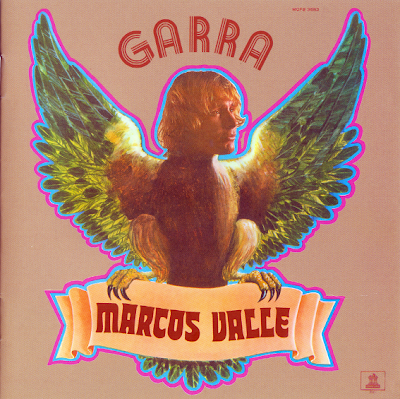An incredibly rich and diverse album.


I originally posted this review back in March, 2013, on Amazon UK. This version is slightly revised.
An enormously wide-ranging and varied album, this is one of the many reasons I love both Brazilian music of this era, and also just much of the music of the time as a whole. One can’t imagine many artists nowadays getting such a diverse polyglot explosion of artistic creativity past the record execs. Having come up as a second-wave bossa dude, all clean cut, with a beautiful wife and an armful of gorgeous bossa nova tunes, Valle and brother Paulo Sergio allowed themselves to move with the times, absorbing myriad sounds and influences and putting them all together in a unique and wonderful way.
I’m what I like to call a ‘naturalist and free thinker’, but opening track Jesus Meu Rei could almost have me back in the flock, it’s such a joyous piece of gospel-soused loveliness. Valle has a beautiful voice, and the music is just unlike anything else, ever. So too with Com Mais De 30, a bubbling cauldron of gentle breezy bossa/samba mixed with easy listening textures that’s a beautiful little musical bibelot, with excellent lyrics at once humourous and profound, about ageing. Roughly translating as ‘don’t trust anyone over thirty’, a popular hippy slogan of the era, both Marcos Valle himself and lyricist brother Paulo Sergio were by the time this was recorded, just into their thirties.
Track three, the title track veers all over the place, with a loping funky groove, one minute Valle sings breathless almost comic easy-listening style ‘ha-ha’s (on the offbeats, a favourite trick of his), the next it’s stripped down to strings, recorders and/or mellotron. Truly amazing music, without any recognisable boundaries, and utterly joyful. Next up, Black Is Beautiful, combines Brazilian lyrics with an English chorus, and once again flits across the musical map in a way that’s almost psychedelic, based around a slow, stately 6/8 rhythm, the music is drenched in easy listening horns and strings, and the lyrics seem to be a celebration of the diverse ethnicity so integral to Brazil, as well as, more obviously, a love song to black beauty, with references to the ‘sangue’ (blood) of Africa and Europe. Terrific!
Ao Amigo Tom is a gentle bossa, reminiscent of Valle’s early records, and I suspect the Tom may be Antonio Carlos ‘Tom’ Jobim. Jobim was slated to produce/direct Valle’s debut, but in the end couldn’t, and so the job devolved upon another Brazilian superdude, Eumir Deadato. Valle shows complete mastery of the ‘vialoa e voz’ medium, with gorgeous melody and harmony, a proper tribute to a beloved hero/influence.
Paz e Futebol and Que Bandira are more from the MPB end of the spectrum, big Brazilian pop productions, but once again indelibly stamped with the Valle genius. The next track that really scores for me (note cheesy football pun) is Wanda Vidal, an amazing slab of cosmic Brazilian funk. Nothing like any James Brown or US rare groove, and with a goofy easy-listening middle-eight, but the lazy loping bass and keys, and the chicken scratch guitar… It’s just brilliant, and largely ’cause it’s like no other music on Earth. Joyous!
Minha Voz Zira Do Sol Da America is a baroque pop instrumental gem, with that kind of transcendent uplifting joyfulness Valle excels at. If I understand it correctly Vinte E Seis Anos De Vida Normal, another MPB nugget, replete with strings and brass, is a song about wanting to make it, to get known, having spent ’26 years on the margins’. So, not only is the music great, but the lyrics are intriguing too.
O Cafona is another of the three tracks on this album (and there are others on other Valle albums) in which the lyrics use breathless offbeat vocal gymnastics to great if oddball effect. Try singing like that. If you’re anything like me, you’ll almost expire with the effort. But Valle makes it seem both effortless, and far more dignified than it ought to! This is one of several tracks with a loping, lumbering, almost funky rhythm section, and wonderful keys and guitars, layered in all kinds of unexpected ways. It’s not my favourite vein of his work – Vento Sul (mis-titled as Vento Soul here on Amazon UK) and Previsao Do Tempo are his masterpieces as far as I’m concerned – but this is truly unique and exceptional music.
The Japanese reissue adds Berenice, whereas the Light In The Attic US reissue ends with O Cafona. Some rate Garra as Valle’s best.As I say, I prefer Vento Sul and Provisao Do Tempo, but everything he did around this time is magical, really, and well worth having.
